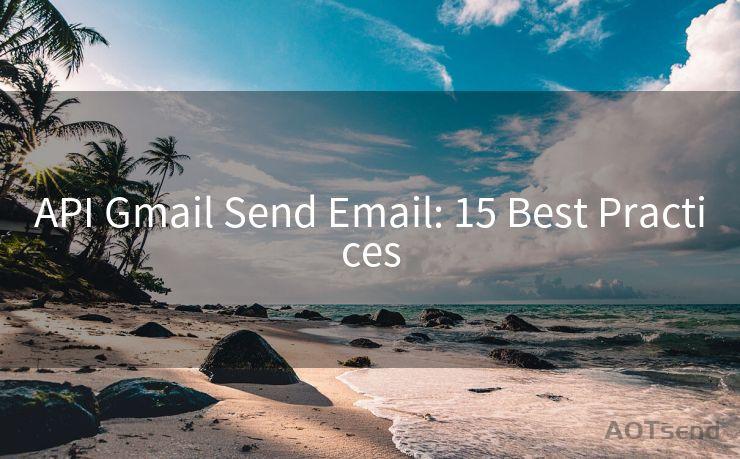API Gmail Send Email: 15 Best Practices




When it comes to sending emails programmatically, the Gmail API provides a robust and flexible solution. However, to ensure your emails are delivered effectively and efficiently, it's essential to follow best practices. Here are 15 best practices for using the Gmail API to send emails.
1. Authenticate Properly
Before you can use the Gmail API to send emails, you must authenticate your application. Make sure to follow Google's OAuth 2.0 protocol for secure authentication. This ensures that your application has the necessary permissions to access and send emails from a user's Gmail account.
2. Use the Correct Scope
When authenticating, request the appropriate scope for sending emails. The "https://www.googleapis.com/auth/gmail.send" scope allows your application to send emails on behalf of the authenticated user.
3. Handle Errors Gracefully
Implement robust error handling mechanisms to catch and manage any potential issues that may arise during the email sending process. This includes handling rate limits, connection timeouts, and other potential API errors.
4. Optimize Your Code

Ensure that your code is optimized for performance. This includes minimizing the number of API calls, using batch requests when possible, and avoiding unnecessary network latency.
5. Personalize Your Emails
Use the Gmail API's advanced features, such as personalized content and dynamic templates, to create engaging and relevant emails. This can significantly improve open and click-through rates.
6. Comply With Anti-Spam Policies
Familiarize yourself with and adhere to anti-spam policies, such as the CAN-SPAM Act in the US. This includes providing a clear and conspicuous unsubscribe option in all your marketing emails.
7. Monitor Your Email Deliverability
Regularly check your email deliverability rates and bounce rates. Use tools like Google Postmaster to monitor and improve your email sending reputation.
8. Protect User Privacy
When handling user data, always ensure compliance with privacy regulations, such as GDPR in Europe. Encrypt sensitive data and only use it for the purposes explicitly stated in your privacy policy.
9. Test, Test, Test
Before sending out mass emails, conduct thorough testing to ensure your emails display correctly on various devices and email clients.
10. Use the Right MIME Type
When constructing your emails, make sure to use the correct MIME type. This ensures that your emails are properly formatted and displayed across different platforms.
11. Optimize Images and Attachments
If you're including images or attachments in your emails, make sure to optimize them for size and loading speed. Large files can slow down email delivery and increase bounce rates.
12. Track Your Metrics
Utilize tracking pixels or other analytics tools to measure the performance of your email campaigns. This helps you understand user engagement and refine your strategies accordingly.
13. Follow Email Best Practices
Adhere to general email marketing best practices, such as using a clear and concise subject line, maintaining a clean and professional email design, and providing valuable content.
14. Stay Up to Date With API Changes
The Gmail API is constantly evolving. Stay informed about any updates or changes to the API to ensure your application remains compatible and effective.
🔔🔔🔔
【AOTsend Email API】:AOTsend is a Managed Email Service for sending transactional emails. Support Email Types: reminders, authentication, confirmations, notifications, verification codes, invoices, password resets, account activations, billing statements, two-factor authentication (2FA), and one-time passwords (OTP) emails, etc. $0.28 per 1000 Emails. 99% Delivery, 98% Inbox Rate.
You might be interested in:
Why did we start the AOTsend project, Brand Story?
What is a Managed Email API, How it Works?
Best 25+ Email Marketing Platforms (Authority,Keywords&Traffic Comparison)
Best 24+ Email Marketing Service (Price, Pros&Cons Comparison)
Email APIs vs SMTP: How they Works, Any Difference?
15. Monitor and Adjust
Regularly monitor your email sending activities and adjust your strategies based on performance metrics. This helps you maximize the effectiveness of your email campaigns and improve user engagement.
By following these best practices, you can ensure that your Gmail API email sending efforts are successful and efficient. Remember, the key to effective email marketing is providing valuable content to your recipients while respecting their privacy and preferences.




Scan the QR code to access on your mobile device.
Copyright notice: This article is published by AotSend. Reproduction requires attribution.
Article Link:https://www.mailwot.com/p1245.html



